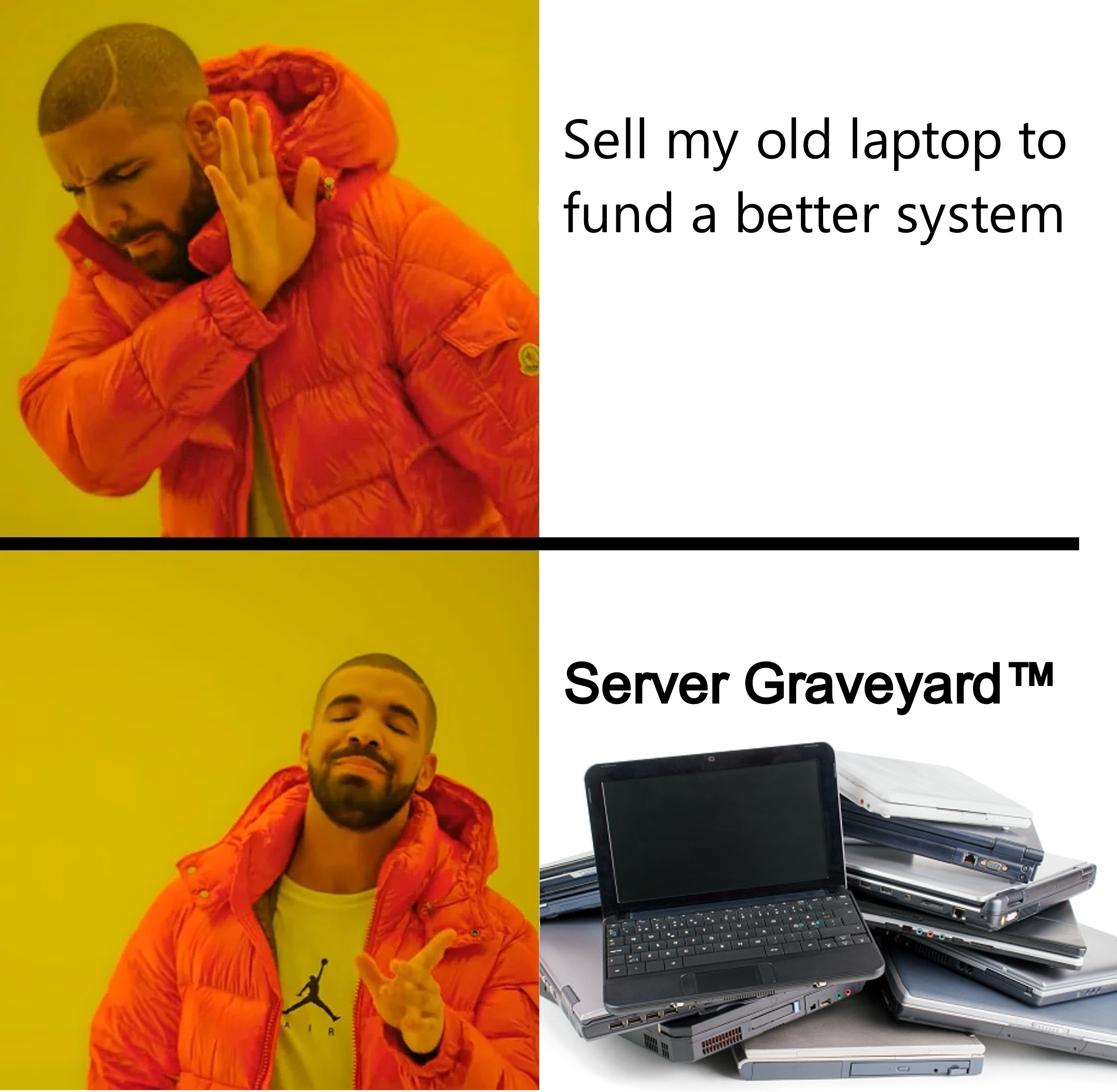Naaaaah... I haven't blown up my pc after it did its service.... Naaaaaaaaah...
@rockhandle That's how I started. Proxmox on a 9 year old laptop with LXC and VMs. Even now that laptop runs proxmox with pfsense and pihole VMs and is serving as my home router :)
Thinkpad T430, i7 gen 1,16gb home server
End of life Chromebooks, baby!
All day long. I ssh into mine & run docker. Works surprisingly well. Better than the $5/month droplet.
Yes I did, but nowadays I have nothing to host things on. Alpine Linux is excellent to host Minecraft servers and the like.
Omg that’s a great idea I have an 8 thread 4 core from 2012 that was my main laptop 3 years ago.
Yup, laptop for testing, old gaming PC for production.
I use old Lenovo tiny units... Can pick them up cheap when businesses upgrade, chuck in a bit extra ram, a new SSD, add it to my proxmox cluster... Then look for excuses to use it so I can justify having yet another one
Yup! Usually running some local/dev docker containers for work, so I don't slow down the laptop I'm actually using with background stuff. They get hot, and I keep them in places where they get hot, but they haven't died from the heat yet.
My home server started as an HP Pavilion P6803w desktop PC. A decade later it has a better case, better power supply, more RAM, better CPU, more drives and runs Debian instead of Windows 7. The only original part is the motherboard.
I thought about it, but the additional display, made me think about power saving, how to shut off screen, while keeping the headless service loaded? ... premature optimization?
In Linux it is possible to turn the screen off after a timeout and keep the system on with the lid closed.
Exactly, and what other OS to use for old device turned server than Linux?
You can use windows 7 or windows AME but not sure it's a good idea tho. What's wrong with using Linux?
I meant it as rhetorical question with obvious answer.
I took my first foray into media hosting by running subsonic on an old emachines laptop! ain't nothing wrong!
A busted up acer netbook on a shelf in my basement ran a Final Fantasy XI private server for several years till it died and I migrated to something sturdier.
Display was wrecked, keyboard destroyed, trackpad gone.. but a single usb port and a vga port still worked so I was able to install an OS. then I removed those and only ever remoted into it. I actually removed the busted display and keyboard to it'd vent heat better - it ran pretty hot and the ventilation on that thing was designed poorly. The reason the keyboard died was actually heat related, melting its underside and warping it.
FFXI Private servers will run on a 2 decades old potato, so this worked until it finally died despite some seriously pathetic specs.
(1gb ram upgraded to 2gb, 1 ghz intel atom single core cpu, yes really)
Got a laptop with a busted up screen running Plex and it's pretty awesome! We don't need screens where we're going!
I used to use my 10 year old old netbook (intel atom n270 2gb ram - ubuntu server) as a server for Plex, calibre, pihole, ssftp.
Now I am using a Raspberry Pi 4 8GB Ram, as it consumes less electricity. Old laptops are consuming (except HDDs/SSDs) 10-30 watt. Raspberry Pi in indle consumes 2watt and when i am using it at mac power with an external hdd consumes 12watt.
I have like 3 spare laptops, and another spare computer. I'm not running anything right now because this router doesn't support port forwarding no matter what I try (it's a firmware issue apparently), but they're always there for me when I need them.
You could maybe rent a cheap VPS and use that as a reverse proxy. Using Tailscale to create a VPN tunnel so you don't need port forwarding
Duplicate
Selfhosted
A place to share alternatives to popular online services that can be self-hosted without giving up privacy or locking you into a service you don't control.
Rules:
-
Be civil: we're here to support and learn from one another. Insults won't be tolerated. Flame wars are frowned upon.
-
No spam posting.
-
Posts have to be centered around self-hosting. There are other communities for discussing hardware or home computing. If it's not obvious why your post topic revolves around selfhosting, please include details to make it clear.
-
Don't duplicate the full text of your blog or github here. Just post the link for folks to click.
-
Submission headline should match the article title (don’t cherry-pick information from the title to fit your agenda).
-
No trolling.
Resources:
- selfh.st Newsletter and index of selfhosted software and apps
- awesome-selfhosted software
- awesome-sysadmin resources
- Self-Hosted Podcast from Jupiter Broadcasting
Any issues on the community? Report it using the report flag.
Questions? DM the mods!
